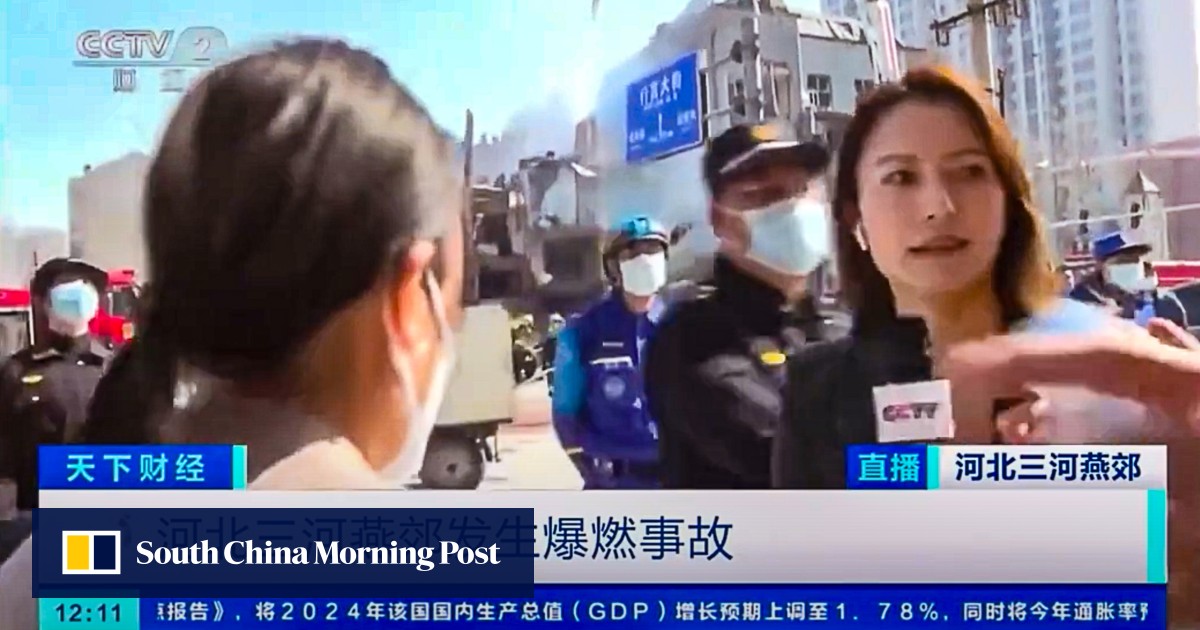
In another video, reporters were seen surrounded by a group of uniformed police officers telling them to leave the scene. A reporter with China Media Group, of which CCTV is a division, was heard saying “we three reporters are shoved by a dozen people”.
The incident sparked controversy and became a trending topic on social media platform Weibo.
Shocking video captures moment fatal blast destroys building near Beijing
Shocking video captures moment fatal blast destroys building near Beijing
On Thursday, local authorities issued a statement saying they were “deeply remorseful” and apologised to the journalists.
The statement said the emergency response office ordered a fast evacuation at the scene to prevent secondary accidents, and local staff were following the order. The staff asked everyone except professional rescuers to leave and “forcibly persuaded” the journalists, who insisted on staying, it said.
The statement acknowledged that staff at the scene had “poor communication skills” and adopted “rough and simple” measures that “triggered misunderstanding among journalists” and raised controversy among the public. The staff involved were reprimanded, and the journalists have been given apologies, it said.
On Wednesday, the All China Journalists’ Association, a semi-official association, called on authorities to make it easier for journalists to conduct on-site interviews when responding to emergencies.
Authorities should not “simply and brutally obstruct journalists in the normal performance of their duties for the sake of controlling public opinion”, the association said.
Hu Xijin, the outspoken former editor-in-chief of nationalist tabloid Global Times, wrote on Weibo that news organisations have the right and duty to conduct on-site reporting, especially for accidents and disasters. He added that local governments should “facilitate news coverage when on-site rescue is undisturbed, rather than interfering or stopping it”.
“This is a lack of respect for the public’s right to information, and an ungrounded restriction on the media’s right to report and monitor,” he wrote.
Many social media users pointed out that state media are typically granted more access for on-the-ground reporting than other media outlets, and that all journalists should receive equal access and fair treatment. They highlighted previous cases of journalists who were beaten or summoned by authorities.
Beijing controls media coverage and carries out vast online censorship to keep unflattering information out of the news. In recent years, news outlets have often been required to wait for and publish briefings from officials or state media following accidents and natural disasters, and they are generally discouraged from investigating emergencies.
Journalists also face strict controls on media qualifications. Authorities run a press licensing system and journalists must hold press cards endorsed by the government agency responsible for media regulation.
China’s emergency law amendment may curb media reporting on disasters
China’s emergency law amendment may curb media reporting on disasters
The draft amendment also requires the government to clarify any information that it becomes aware of “that may affect the stability of society”.
Early on Wednesday, a blast occurred in Sanhe county of Langfang in northern Hebei province, neighbouring Beijing. As of Thursday, seven people were dead and 27 were injured, according to a government statement.
Fourteen of the injured have been discharged from hospital and others are not in critical danger, the statement said. The cause of the accident is still under investigation.


